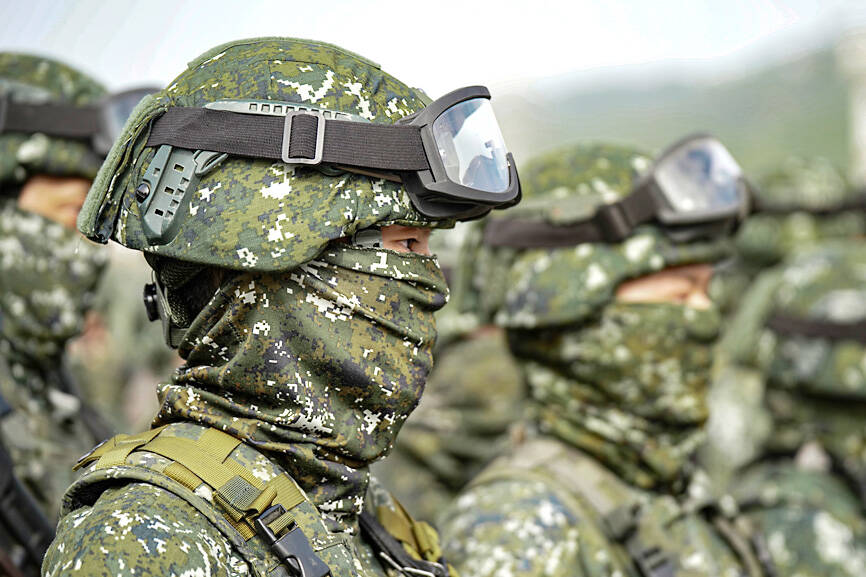The armed forces must do more to address low retention rates among elite officers who received training at foreign military academies, the Control Yuan said in a news release yesterday.
The Ministry of National Defense has programs to select top-performing cadets to study at prestigious foreign military academies to learn about military trends and enhance military ties with partners.
However, most Western-trained officers have retired from the military after completing their required 10 years of service, the ministry said.

Photo: Aaron Tu, Taipei Times
The programs have not only failed to achieve their goal, but also resulted in the additional loss of talented personnel to early retirement, the Control Yuan said.
The ministry in December last year said that Taiwan’s first West Point-trained officer, Colonel Hung Wan-ting (洪琬婷), had opted for early retirement.
In February, Control Yuan members Pu Chung-cheng (浦忠成), Lin Wen-cheng (林文程) and Lai Ting-ming (賴鼎銘) launched a probe into the matter, with a report saying that institutional flaws impeded the professional development of officers from US military academies.
The retention rate of officers who attended foreign military academies has declined in the past few years, with the army struggling more than the air force or the navy, the Control Yuan said.
The ministry should review its policies and propose solutions to ensure that study abroad programs — which cost a lot — have the desired effect, it said.
The military should seek exchange programs with the military academies of “Five Eyes” members, Japan, South Korea and Southeast Asian nations, instead of being limited to the US and other partners in the Americas, the Control Yuan said.
The probe’s findings were approved by the Legislative Yuan’s Foreign Affairs and National Defense Committee and on Thursday last week filed for the ministry’s consideration, it said.
Taiwanese officers who received training at US military academies on average served 14.3 years in the military, including of their four years of education, the ministry told the legislature in a report late last year.
The report said that 82.5 percent of retired military personnel left the service by choice, 15 percent retired for health reasons and 2.5 percent were involuntarily discharged, it said.

SHIPS, TRAINS AND AUTOMOBILES: The ministry has announced changes to varied transportation industries taking effect soon, with a number of effects for passengers Beginning next month, the post office is canceling signature upon delivery and written inquiry services for international registered small packets in accordance with the new policy of the Universal Postal Union, the Ministry of Transportation and Communications said yesterday. The new policy does not apply to packets that are to be delivered to China, the ministry said. Senders of international registered small packets would receive a NT$10 rebate on postage if the packets are sent from Jan. 1 to March 31, it added. The ministry said that three other policies are also scheduled to take effect next month. International cruise ship operators

HORROR STORIES: One victim recounted not realizing they had been stabbed and seeing people bleeding, while another recalled breaking down in tears after fleeing A man on Friday died after he tried to fight the knife-wielding suspect who went on a stabbing spree near two of Taipei’s busiest metro stations, Taipei Mayor Chiang Wan-an (蔣萬安) said. The 57-year-old man, identified by his family name, Yu (余), encountered the suspect at Exit M7 of Taipei Main Station and immediately tried to stop him, but was fatally wounded and later died, Chiang said, calling the incident “heartbreaking.” Yu’s family would receive at least NT$5 million (US$158,584) in compensation through the Taipei Rapid Transit Corp’s (TRTC) insurance coverage, he said after convening an emergency security response meeting yesterday morning. National

PLANNED: The suspect visited the crime scene before the killings, seeking information on how to access the roof, and had extensively researched a 2014 stabbing incident The suspect in a stabbing attack that killed three people and injured 11 in Taipei on Friday had planned the assault and set fires at other locations earlier in the day, law enforcement officials said yesterday. National Police Agency (NPA) Director-General Chang Jung-hsin (張榮興) said the suspect, a 27-year-old man named Chang Wen (張文), began the attacks at 3:40pm, first setting off smoke bombs on a road, damaging cars and motorbikes. Earlier, Chang Wen set fire to a rental room where he was staying on Gongyuan Road in Zhongzheng District (中正), Chang Jung-hsin said. The suspect later threw smoke grenades near two exits

The Forestry and Nature Conservation Agency yesterday launched a gift box to market honey “certified by a Formosan black bear” in appreciation of a beekeeper’s amicable interaction with a honey-thieving bear. Beekeeper Chih Ming-chen (池明鎮) in January inspected his bee farm in Hualien County’s Jhuosi Township (卓溪) and found that more than 20 beehives had been destroyed and many hives were eaten, with bear droppings and paw prints near the destroyed hives, the agency said. Chih returned to the farm to move the remaining beehives away that evening when he encountered a Formosan black bear only 20m away, the agency said. The bear